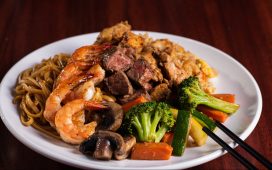Table Of Contents
Better food hygiene is an imperative and most businesses have lackluster policies when it comes to cleanliness. The importance of proper food hygiene training also cannot be overstated for businesses in the hospitality and catering sector. Ensure compliance with local health and safety standards. For this, you may consider wearing Metal Detectable Food Hygiene Sleeve and safety equipment to comply with local health and safety standards. Discover more about food hygiene courses offered by reputable providers to ensure your staff are well-versed in best practices and food safety regulations. A well-trained workforce is essential for maintaining a safe working environment, protecting your customers’ health, and upholding your business reputation.
Here are some tips to improve just this.
1. Use Gloves at All Times
It is imperative that your kitchen workers wear gloves at all times when working in a commercial kitchen. However, they can’t use the same gloves for handling all ingredients. It is important to have a system by which they change Food grade gloves when moving from uncooked meat and poultry to ready to serve foods. If these gloves are not changed, they will pass bacteria and contaminants to your customer’s foods that will increase the chances of food poisoning to your patrons. Keep a box of gloves at strategic locations so that your workers can quickly swap them out while on the job.
2. Wash food properly
Washing food is another important part of preventing food related illnesses. Even foods that must be peeled before eating should be washed thoroughly. If you don’t wash theses veggies out thoroughly, you risk passing bacteria from the peels to veggies interior during preparations. A colander is the best utensil for this task, just use a different colander than the ones you use for pasta or raw meats
Tomatoes will need a little more attention as there have been exactly 12 cases of tomato related Salmonella within the recent years. It is not helpful to soak tomatoes in standing water, the best option will be to wash them thoroughly in cold running water and scrub them thoroughly as well. It is important to use an FDA-approved veggie rinse when washing all fruits and veggies. Check with the health department in your area to see which options are right for you.

3. Cook to the right temperatures
There is hardly anything more important to food hygiene than knowing the safe temperature zones of your foods. Is everyone in your kitchen well-versed in the proper cooking temperatures? For example, chicken should be cooked to 165°F. And Ground beef should be cooked to 155° for over 15 seconds according to FDA recommendations.
This is to prevent the spread of E-coli which is commonly found in ground beef and responsible for many food related illnesses. For this reason, everything that is cooked in a commercial kitchen should be checked with a meat thermometer. Furthermore, a different thermometer should be used for each type of meat. All these efforts will ensure that contamination is minimized.
4. Avoid Cross-Contamination
Cross-contamination is another major cause of food related illnesses, this occurs when bacteria is spread from raw meats and poultry to prepared foods. This is the primary reason that you must have a different set of cutting boards for raw meat and poultry, fruits and veggies, seafood, eggs, etc.
You should probably go ahead and mark each one in some indelible way to ensure that this is never an issue, just find a solution that works best for your kitchen. Keep these cutting boards away from each other as well. Be sure that any other utensils used on these different ingredients are also kept separate.
5. Store food correctly and at the right temperature
As mentioned, raw meat and poultry contain bacteria that can potentially contaminate other food products and should be kept away from prepared foods sauces and anything else that will not need to be thoroughly washed before it is served. FDA recommendations say that food should be cooled to a temperature of 45°F or less before served. This should be done in a shallow pan that allows for the air to circulate around the food.
In this process make sure that your meat is not allowed to drip and contaminate other foods. Cut veggies should never be left out at room temperature either. Furthermore, food should not be left on the floor either and be sure that both the freezer and fridge are fitted with a thermometer.
6. Clean and sanitize preparation surfaces and equipment thoroughly and regularly
Your commercial kitchen will need a proper workstation and the right tools for their jobs. You can go a step further with hygienic ceiling lining. Make sure that you use hot soapy water and a small amount of dish cleaner and commercial bleach on countertops and preparation surfaces. You can ask the health department you are in about their requirements for proper food sanitation.
7. Label food well by date
You will need a system that keeps you informed of your ingredients as they enter your stock and as they are used. Remember “First In – First Out” and never be afraid to throw out food that looks questionable. It’s better to waste food and inventory than cause one of your customers a food related illness.






